Longest Senate Speeches in History: What Booker’s Record Signifies
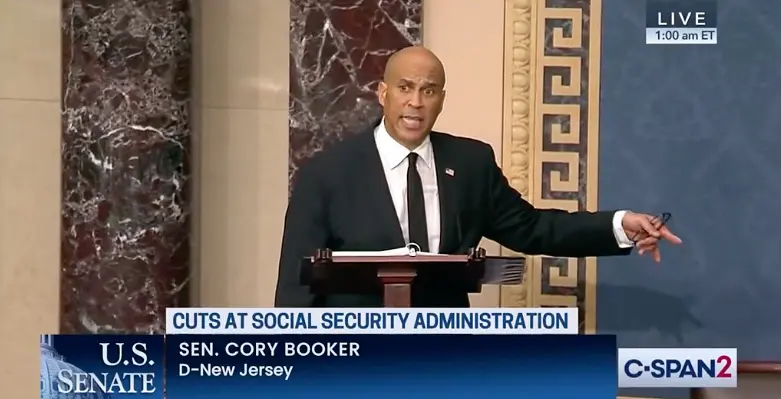
Cory Booker delivers the longest speech in Senate history, beginning on March 31, 2025 and concluding the following day. (Source)
May 14, 2025 ~ By Brooke Pland
By speaking for more than 25 hours on the Senate floor, Cory Booker broke Strom Thurmond’s record for the longest speech delivered in Senate history
“These are not normal times in our nation,” began Senator Cory Booker on the evening of March 31, “and they should not be treated as such in the United States Senate.” Booker’s powerful opening remarks set the tone for what would soon become the longest speech in U.S. Senate history. Beginning at 7pm, Booker spoke through the night and did not yield the floor until after 8pm the following day, concluding his speech after a record-breaking 25 hours and 5 minutes.
Booker, a 55-year-old Democrat from New Jersey and the former mayor of Newark, has served in the Senate since 2013. He held the floor amid the chamber’s vote to confirm the next U.S. Ambassador to NATO in order to address the state of the nation just ten weeks into President Trump’s second term. “The threats to the American people and American democracy are grave and urgent,” he declared. He did not stop to eat, sit, or use the bathroom at any point during his speech, lest he yield the floor.
Cory Booker’s efforts are the latest in America’s history of long Senate speeches, which dates back to the early 20th century. The previous record of 24 hours and 18 minutes – held by South Carolina Senator Strom Thurmond for his 1957 filibuster against the passage of the Civil Rights Act – sat for nearly 70 years until Booker’s marathon speech.
History of the Senate’s Longest Speeches and Filibusters
Booker’s speech finds company among a number of lengthy speeches throughout the Senate’s history; in fact, Booker’s is the 10th in 125 years to run longer than 14 hours. Many such speeches were filibusters delivered to delay or prevent the passage of specific legislation. Practically all of them have focused on a single issue, and a number of them have incorporated completely irrelevant information to draw out their length on the floor. Occasionally, the Senate has seen group filibustering efforts, with speeches delivered by multiple senators to give the primary speaker a repose.
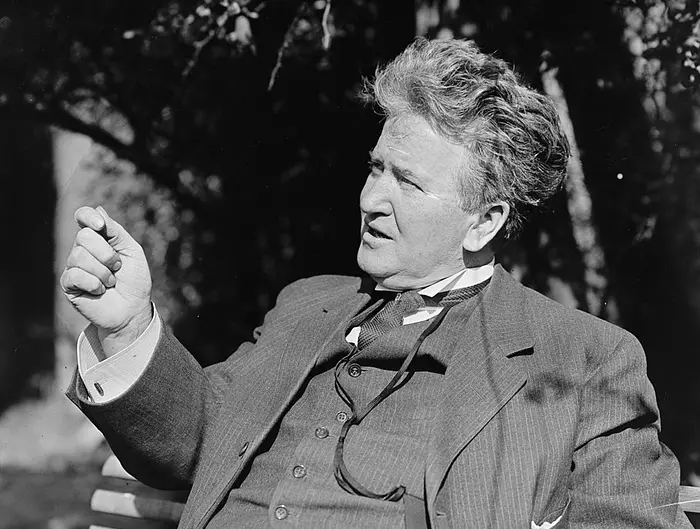
Senator Robert La Follette’s speech lasted more than 18 hours in 1908. (Source)
The first example of such oration in the 20th century dates back to 1908, when Wisconsin Senator Robert La Follette – considered by President John F. Kennedy to be one of the five most important American senators of the time for his tireless devotion to progressive social reform – spent a consecutive 18 hours and 15 minutes speaking in an attempt to block the Senate’s adoption of a conference report.
Nearly 20 years later, in 1935, Senator Huey Long of Louisiana filibustered against the federal appointments process for 15 hours and 30 minutes, attempting to keep the oversight of senior senatorial appointments under the jurisdiction of the National Recovery Administration to prevent his political opponents from obtaining the best jobs in the Senate. His speech strayed far from the topic at hand: At one point, he shared his recipes for southern-fried oysters and ‘Pot-likker,’ saying, “I have stated those recipes for the Record this afternoon so that they may be had by all Members of the Senate and by the public at large tomorrow.”
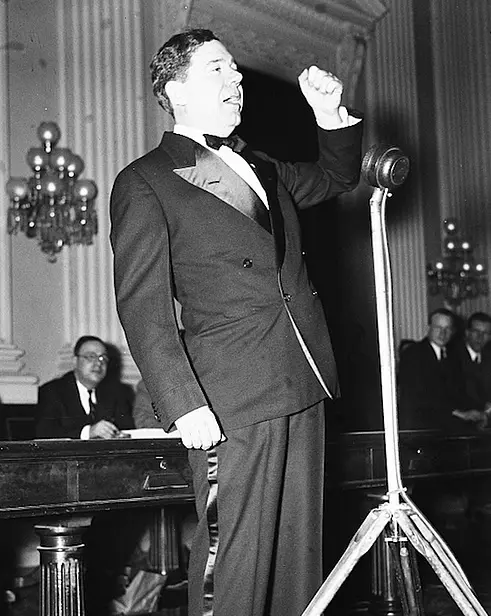
Senator Huey Long giving his speech in 1935. (Source)
The first to speak past the 20-hour mark for the longest Senate speech at the time was Oregon Senator Wayne Morse in 1953. Morse’s speech ran for 22 hours and 26 minutes in an effort to filibuster the Submerged Lands Act, which introduced changes to the transfer of land and oil rights between West Coast states and the federal government.
Thurmond’s Record Senate Speech in 1957
Just four years later, Senator Strom Thurmond delivered his historic speech of 24 hours and 18 minutes to filibuster the passage of the Civil Rights Act of 1957, which aimed to establish a federal Civil Rights Commission, institute a Civil Rights Section within the Justice Department, and allow federal court injunctions for voting interference. Thurmond read aloud alphabetically by state the voting laws of each of the then-48 states, George Washington’s entire 7,600-word farewell address, previous congressional transcripts, countless sections of the U.S. Code Title 18 on Crime and Criminal Procedure, and Supreme Court rulings irrelevant to the legislation at hand.
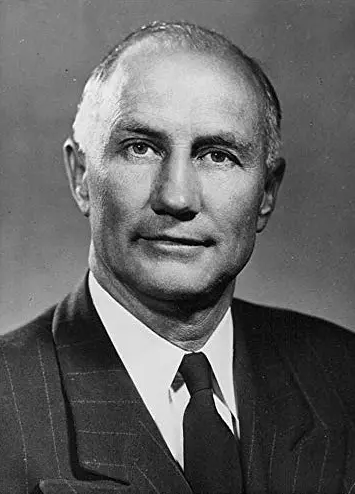
Senator Strom Thurmond. (Source)
Taking a page from Thurmond’s book, Senator Robert Byrd of West Virginia later spoke for 14 hours and 13 minutes to filibuster the Civil Rights Act of 1964, which aimed to prohibit discrimination in public facilities and establish important protections for voting rights and equal employment opportunity.
In 1981, Wisconsin Senator William Proximire spoke for 16 hours and 12 minutes to filibuster President Ronald Reagan’s proposal that Congress increase the national debt ceiling by $94 billion. He concluded his long speech a gentlemanly three minutes before the scheduled start of Congress’ session the next morning.
- More stories: When Columbia University Expelled Robert Burke for Anti-Nazi Protests in 1936
- More stories: Secessions of the Plebeians: A General Strike in Ancient Rome
- More stories: Israel Has Killed Record Numbers of Journalists & Aid Workers Since 2023
In the late 80s and early 90s, Senator Alfonse D’Amato of New York made headlines twice for his marathon speeches. First in 1986, D’Amato spoke for 23 hours and 30 minutes to filibuster legislation which would have eliminated funding for specific aircraft models manufactured on Long Island. He utilized the General Accounting Office’s report on the jet, Air Force testimony about the aircraft, and even the manufacturer’s instructions as reading material throughout his holding of the floor.
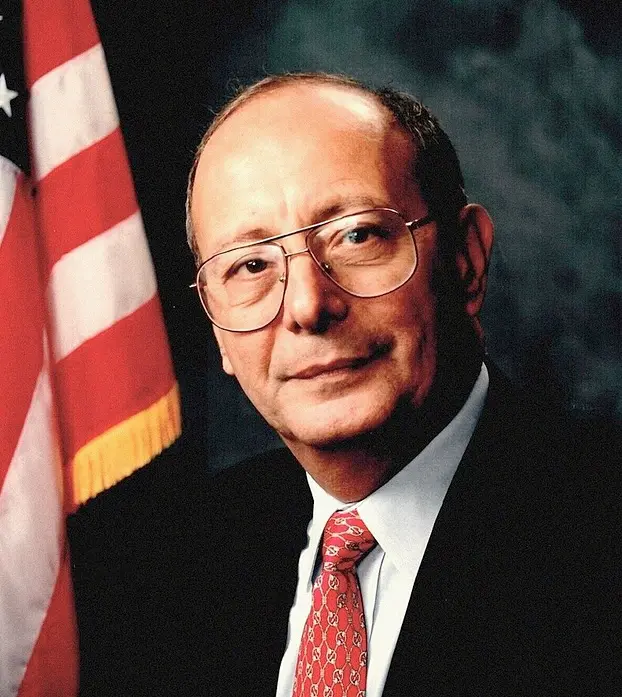
Senator Alfonse D’Amato spoke on the Senate floor for nearly 24 hours in 1986. (Source)
In 1992, he again held the Senate floor to spend 15 hours and 14 minutes speaking against the passage of a $27 billion tax bill which ultimately closed a typewriter factory employing nearly 900 New Yorkers, outsourcing the labor to Mexico. He even mixed singing into his remarks.
Two decades later, Texas Senator Ted Cruz drew on the Senate’s legacy of marathon speeches in his 2013 filibuster against the Affordable Care Act, which lasted 21 hours and 19 minutes. Notably, he read his daughters a bedtime story from the Senate floor, narrating Dr. Suess’ Green Eggs and Ham to the chamber.
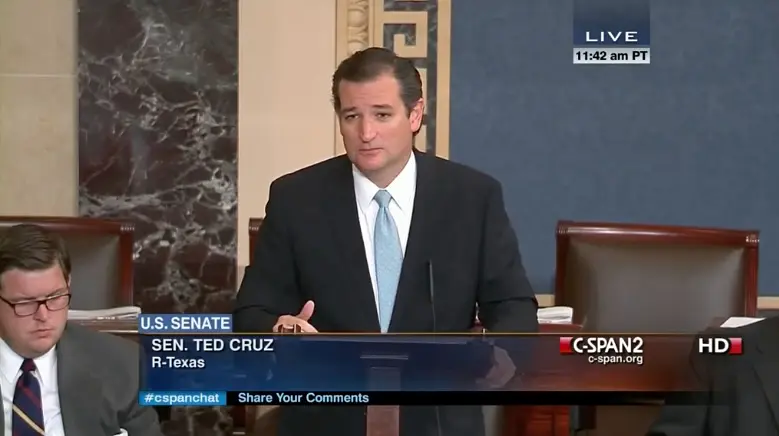
Senator Ted Cruz filibusters against the passage of the Affordable Care Act in 2013. (Source)
The last ten years alone have seen several more attempts at marathon speeches. In 2015, Kentucky Senator Rand Paul spoke for 10 hours to filibuster the extension of expiring sections of the 2001 PATRIOT Act, which drastically expanded the National Security Agency’s parameters for surveillance. In 2016, Democrats led by Senator Chris Murphy of Connecticut spoke on the floor for 14 hours 50 minutes to push for a legislative response to the ongoing gun violence crisis. Finally, in 2017, Senator Jeff Merkely of Oregon delivered a 15-hour-26-minute speech to protest President Trump’s Supreme Court nomination of Neil Gorsuch.
Booker Breaks the Record for Longest U.S. Senate Speeches in History
After more than 25 hours of speaking, Cory Booker surpassed the records of each of his senatorial predecessors. While Booker’s speech is not considered a filibuster, as it did not delay the certification of any legislation, his remarks were far from arbitrary. Booker and his team prepared a total of 1,164 pages of content in the weeks leading up to the speech, including letters from constituents angry with, fearful of, and disheartened by the actions of the second Trump administration.
In fact, Booker read over 200 of these letters throughout the course of the record-breaking Senate speech. He only read material relevant to the topic of his speech, and didn’t rely on time-wasting tactics like many of his predecessors. Instead, he focused solely on the harm perpetrated and promises broken by the second Trump administration thus far.
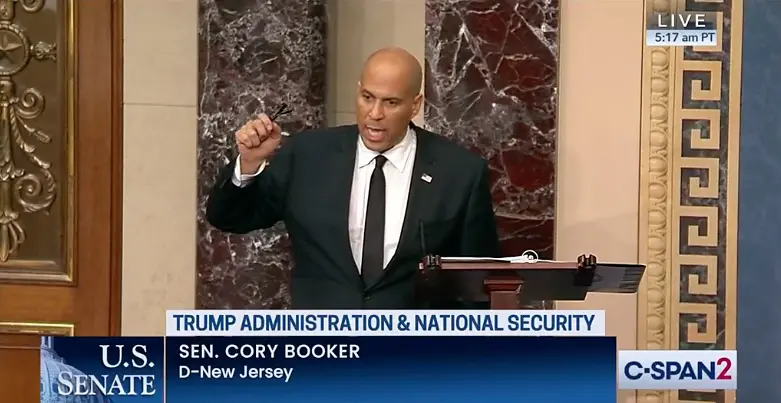
Booker speaks against the policies of the Trump Administration implemented so far in 2025. (Source)
Booker’s speech, built around central themes of justice, unity, urgency, and integrity, was unusual for its coverage of not just one single issue but numerous, from the cutting of Medicaid and Social Security to Elon Musk’s leadership at the Department of Government Efficiency, the president’s talk of annexing Canada and Greenland, and much more. He took questions from Democratic colleagues throughout his long speech, but made clear he had no intention of ceding the Senate floor.
Throughout the duration of the speech, over 28,000 people left encouraging voicemails on Booker’s office line; at one point, over 300,000 people simultaneously watched his floor remarks online on his own online platforms, his office reported.
The breaking of Thurmond’s long-held speech record isn’t just notable for its oratory prowess; it was deliberate, strategic, and symbolic for Cory Booker and his team. “To be candid, Strom Thurmond’s record always just really irked me,” Booker told MSNBC after he ceded the floor. “That the longest speech on our great Senate floor was someone who was trying to stop people like me from being in the Senate…to surpass that was something I didn’t know if we could do, but it was something that…once we got closer, became more and more important to me.”
- More stories: How Isaac Wright Jr Overturned Life Sentence & Became a Lawyer
- More stories: Right-Wing Attacks on No-Fault Divorce Is a Dangerous Reality for Women
- More stories: How a Retractable Syringe Exposed Powerful Group Purchasing Organizations
“Since I’ve gotten to the Senate,” he told CNN, “I always felt [Thurmond’s record] was a strange shadow hanging over this institution. And as a guy who grew up with the legends of the Civil Rights Movement…it always seemed wrong.”
Booker is the first Black senator to represent New Jersey and one of only five Black senators presently serving in the chamber. He also made a point at the opening and conclusion of his speech to thank the Senate chamber staff for their work, including the doorkeepers, pages, and clerks.
Booker’s Most Powerful Moments Speaking on the Senate Floor
“I rise tonight,” Booker explained to the chamber, “because our nation is in crisis: bedrock commitments are being broken; unnecessary hardship is being borne upon Americans of all backgrounds; our institutions are being recklessly and unconstitutionally attacked and even shattered…I rise tonight because to be silent at this moment of national crisis would be a betrayal, and because at stake in this moment is nothing less than everything that makes us who we are.”
Dozens of times throughout the 25 hours of speaking, Booker referred to this moment in history through a framework of questions, namely: “Did you speak up?” and “What can I do?” He stated, “I believe generations from now will look back at this moment and have a single question: ‘Where were you? Where were you when our country was in crisis and when American people were asking for help? Did we speak up?’”
Throughout his record-breaking speech, Booker cited several Black writers, including Langston Hughes’ line, “To save the dream for one / It must be saved for all,” and quoting Alice Walker: “The most common way people give up their power is not realizing they have it in the first place.”
Cory Booker also nodded to the late Republican Senator John McCain, saying that he will never forget McCain’s divergence from his party to vote no on the attempted repeal of the Affordable Care Act in 2017, which, as McCain boldly stated at the time, “offered no replacement to actually reform our healthcare system and deliver quality, affordable health care to our citizens.”
Booker furthermore made numerous references in his speech to legendary Civil Rights leader John Lewis: “Lewis – so many heroes before us – would say that this is the time to stand up, to speak up. This is the time to get in some good trouble, to get into necessary trouble,” Booker said. “Tonight, I rise with the intention of getting in some good trouble.”
“This is our moral moment,” Booker declared on MSNBC. “It’s not left or right, it’s right or wrong.”
- More stories: Hatpin Panic: How Hat Pins Upended Gender Politics in the 20th Century
- More stories: Corporations Embolden Hate When They Cave to Anti-LGBTQ Fury
- More stories: How School Portables Became Permanent Classrooms
- More stories: Riot Dogs: El Vaquita, Loukanikos & Others Who Joined Protesters Against Police






0 Comments